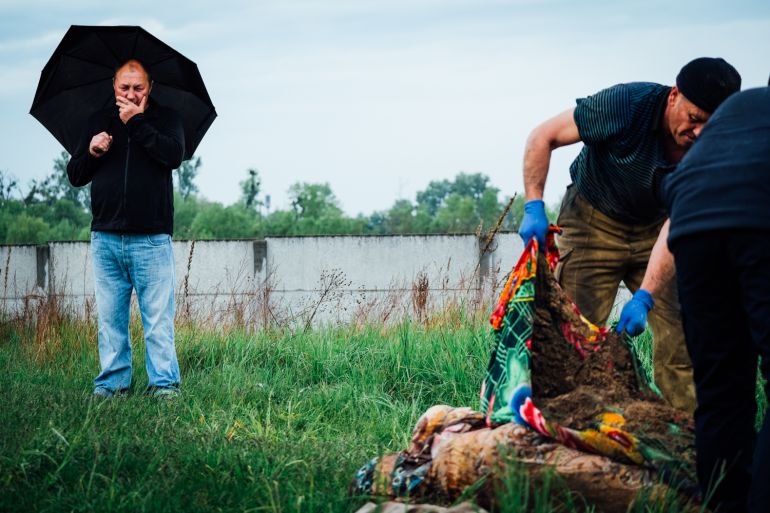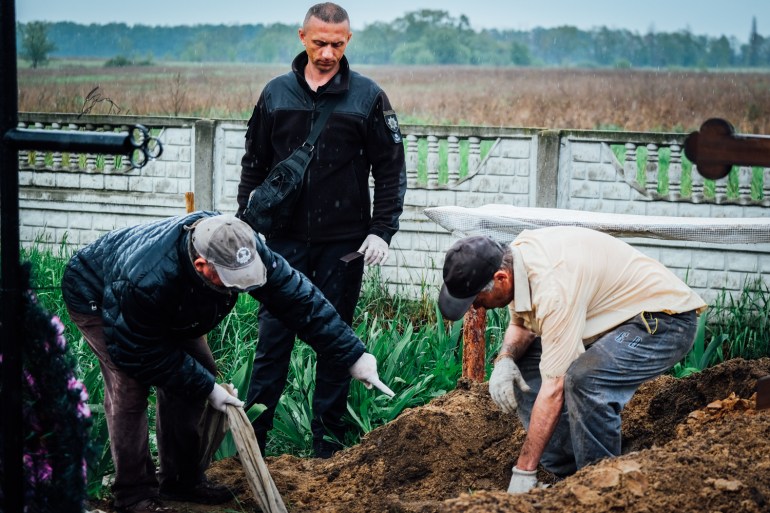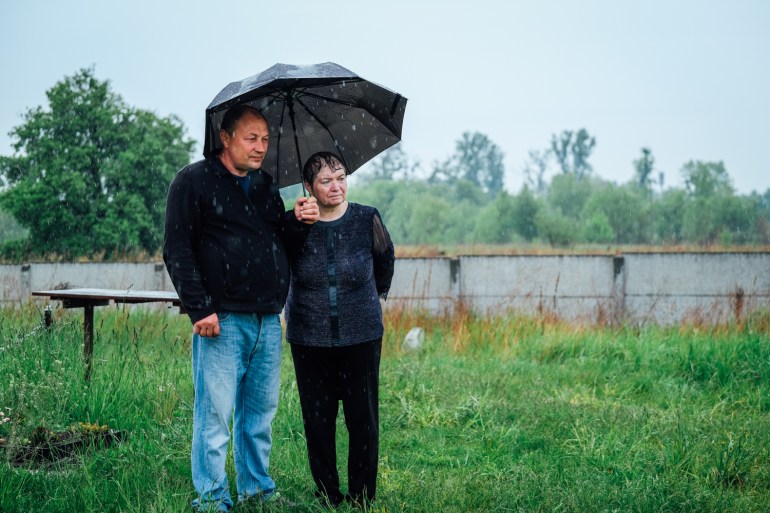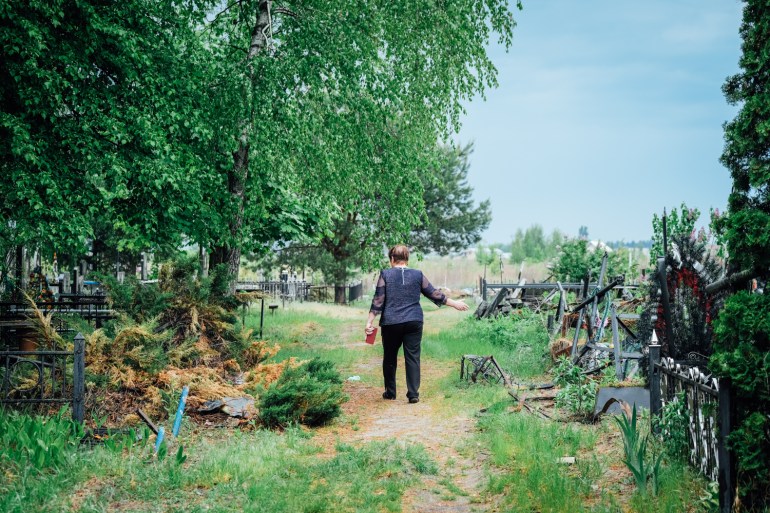Exhuming Ukraine’s dead for war crimes investigations
As Kyiv district authorities investigate possible war crimes perpetrated by Russian troops, volunteers shoulder the harrowing task of exhuming bodies.

Warning: This article includes graphic details that some readers may find disturbing.
Buzova, Ukraine – Oleksandr Bugeruk covers his mouth in horror as five men lift his mother’s body from a grave using two straps of taught cloth.
Keep reading
list of 4 items23:30: The last train to Bucharest
100 days of the Russia-Ukraine war: A battle of beliefs
The volunteers risking their lives to help drug users in Ukraine
The men then stumble over the wet, uneven ground as they carry the body away from the grave. One of them begins to retch from the smell as they place the remains on the ground.
Forty-nine-year-old Bugeruk says he buried his mother, Lydia Chichko, on March 13 as heavy fighting between Ukrainian and Russian forces raged around Kyiv’s suburbs. He recalls the heavy thud of shelling that lit up the night sky as he dug her makeshift grave.
He says his 70-year-old mother, a woman with short auburn hair and a fair complexion, had been preparing lunch earlier in the afternoon when the area came under heavy shelling. He believes she must have heard explosions around her house and run towards the makeshift bomb shelter at the bottom of her garden.
She never made it. A mortar landed nearby, blowing out several windows and sending shrapnel 150 metres (492 feet) in all directions. Chichko died after being struck by a large shard of glass.
A month later, at Bugeruk’s request, her body is being exhumed as the Kyiv district authorities investigate possible war crimes perpetrated by Russian troops in which they allege civilians and infrastructure vital to their survival were deliberately attacked.
After Russia launched its invasion of Ukraine on February 24, its troops occupied the area north of Kyiv as they attempted to storm the capital city.
Fierce Ukrainian resistance stalled the Russians’ progress, eventually forcing them to withdraw in early April, revealing in their wake the brutality of life under occupation.
More than 4,000 civilians, including 200 children, have been killed in the entire country since the invasion began, according to the United Nations High Commissioner on Human Rights (OHCHR). With satellite imagery appearing to show mass graves in occupied territory, the number of civilians killed is likely to be higher.
Since April, France has deployed an on-the-ground forensic team with expertise in DNA to support the Kyiv police in war crimes investigations.
Irina Pryanishnikova, spokeswoman for the Kyiv police, says more than 10 mass graves have been uncovered in that region. To the northwest of the city, more than 1,000 corpses were found in the district that includes the town of Bucha, where Ukraine accuses Russian forces of carrying out one of the most notorious massacres.
She estimates that about half the bodies sustained bullet wounds, often from snipers, while others had died directly from shelling or other causes, such as beatings with blunt objects.
“The cruellest episode in Buchansky took place at a children’s camp where five men were executed. Several more men were executed in the surrounding streets and their bodies burned,” says Pryanishnikova.
“Every exhumation is a tragedy, but for me, the worst thing is to see dead children. I remember when we opened their graves, we would see small hands and feet, but no head.”

A harrowing task
The village of Buzova, sandwiched between a small airfield and a sprawling film studio complex, is on the western outskirts of Kyiv. The village bore witness to several atrocities during the Russian occupation, including the shelling of a private maternity clinic. After the village was liberated, bodies of civilians were found dumped in a well at a local petrol station.
Vitaliy Sukhinin, a squat, matter-of-fact police investigator, unravels the cloth covering Chichko’s body as it begins to pour with rain. Bugeruk, standing under an umbrella, turns away and watches proceedings from the corner of his eye.
The corpse is partially decomposed but still recognisable. Bugeruk stands frozen with shock for half a minute before turning his eyes away and staring out into the thick forest surrounding the village cemetery.
Ludmila Zakabluk, a sociable and conscientious woman in her 60s who heads the Buzova village council, walks over to Bageruk to offer a few words of comfort. She then stands quietly by his side as the rain hammers the umbrella above their heads.
Police investigators briefly surround the body, documenting it with their cameras before discretely moving on to another grave.
The gravediggers then regroup around the burial site of Bugeruk’s 20-year-old son, who was known by his patronymic, Oleksandrovych. They discuss how best to remove his remains from the grave they had dug up earlier. Most of those exhuming bodies around Kyiv are volunteers with no previous experience and a couple of them appear to find the task visibly nauseating.

They decide that since the remains are relatively light, it is easier for one of them to physically enter the grave and lift them up from below. A wiry man in a blue beanie and torn trousers offers to do it. After a lung-busting struggle, he hoists the remains out of the grave, and the rest of the men carefully place them by Lydia’s Chichko body.
It was on February 28 that Bugeruk received the call from a friend telling him that his son had been killed while helping people evacuate from Irpin, a town 20km (12 miles) north of Kyiv. Oleksandrovych, a tall taxi driver with short brown hair, large square glasses and a neat circle beard, had been helping locals evacuate since Russian troops had entered the region a few days earlier.
A Russian tank had fired directly at his car, leaving his body so badly mutilated that only parts could be recovered from the wreckage.
Devastated but determined, Bugeruk embarked on the treacherous journey in the direction of Kyiv, where he picked up his son’s remains and wrapped them in a few bedsheets, which he tied with a knot. He buried them later that night.
“What can I say?” he says looking at the ground, with a heavy sigh as he attempts to describe how it felt to bury his son.
Today, Sukhinin approaches the remains and attempts to undo the knot, grimacing as the putrid smell fills his lungs. He briefly catches a glimpse of the body through an opening in the sheets before averting his eyes.
He announces that he cannot identify the son’s remains but that the condition of his grandmother suggests that her death was a war crime. “They were not part of the armed forces; they were civilians,” he says, before adding that the bodies will be removed for further investigation.

‘Beastly and cruel’
Bugeruk had initially requested that the authorities exhume the bodies to receive dignified burials. However, the police and security services launched an investigation once the authorities were notified of the case.
Zakabluk, the town council head, moves aside as a black cargo van, reappropriated for transporting exhumed bodies, pulls up alongside the two corpses. Two young men jump out and slowly approach a couple of the gravediggers. They discuss how to best place the bodies in the body bags.
They manage to fit Chichko’s corpse into the body bag, and one of them zips it up, turning his head towards the sky as he seals it over her face.
Her grandson’s remains prove much more awkward to move, and it takes several attempts before the men can roll them into the body bag. They are unable to secure the zipper and eventually give up, simply heaving the two corpses into the van and driving off, leaving Bugeruk alone in the rain, surrounded by a dispersing cloud of exhaust fumes.
Bugeruk did not cry during the exhumations, but his face betrays a deep sorrow. He remains standing for some time, his eyes focused on the horizon, occasionally muttering under his breath.
The bodies will be taken to the morgue for forensic examination, after which they will be returned and given a conventional burial by the authorities.
Zakabluk, who has attended two other exhumations in recent weeks, is unsure where the bodies will eventually be buried. Russian troops had, according to her, deliberately taken a diversion to destroy the village’s graveyard, driving their tanks repeatedly over the graves. Today, the broken tombstones and mangled fences lay strewn over the ground.
She describes the Russian soldiers that occupied her village as “beastly and cruel”. She recalls that they would drive around in tanks “destroying everything”, adding angrily, “I wish no one in any society will ever have to meet a Russian soldier”.